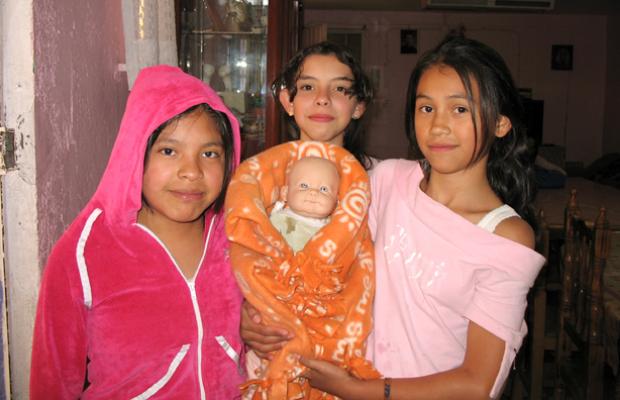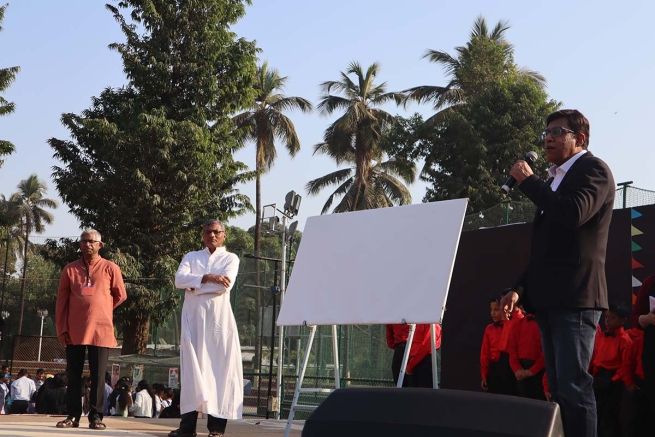GLOBAL: Salesian Missions Highlights Girls Education and Empowerment Programs for 16 Days of Activism Against Gender-Based Violence

(MissionNewswire) Salesian Missions joins the international community in honoring the 16 Days of Activism Against Gender-Based Violence which began on the International Day for the Elimination of Violence Against Women (November 25) and will conclude on International Human Rights Day (December 10). This year’s theme “From Peace in the Home to Peace in the World: Make Education Safe for All” draws attention to the impact of gender-based violence and the violent conflict around educational rights.
According to USAID, the lead U.S. government agency that works to end extreme global poverty and enable resilient, democratic societies to realize their potential, there are more than 62 million girls around the globe who are not in school. Many families cannot afford school fees and others send their daughters to work at a young age instead. As a girl ages, the fight to get an education becomes progressively more difficult. USAID notes that in the developing world, one in seven girls is married before her 15th birthday. Girls with secondary schooling are up to six times less likely to marry as children compared to girls who have little or no education.
For those who are able to attend school, the walk to and from school is often unsafe. Around the world, 246 million children experience gender‐based violence at or on their way to school every year. A report released by the United Nations Human Rights Council noted that attacks on schools occurred in at least 70 countries between 2009‐2014, and that approximately 3,600 attacks against schools, teachers and students were recorded in 2012 alone.
“Young women and girls face many disadvantages and barriers to accessing education and achieving financial independence despite their huge potential,” says Father Mark Hyde, executive director of Salesian Missions, the U.S. development arm of the Salesians of Don Bosco. “It is very important for girls to attend school and gain an education. Girls that are empowered though education are more often able to achieve financial independence, marry at an older age and make better and healthier choices that affect not only themselves, but their families and communities as well.”
In honor of the 16 Days of Activism Against Gender-Based Violence, Salesian Missions is proud to highlight programs around the globe that empower and educate young women and girls.
BOLIVIA
Started in 1992, the Casa Maín girl’s home in Santa Cruz, Bolivia, provides shelter, nutritious meals and schooling for girls and young women with little access to education and those who were once living on the streets. Currently, there are more than 160 girls living and being educated at the home. Casa Maín is comprised of three houses and the girls are divided among them by age. The youngest girls, attending elementary school, live together in one house supported by several volunteer students from the secondary school. A second house provides shelter and peer support for girls attending secondary school while a third house is for young women attending the local university.
The university students enjoy a setting that allows them to finish their degrees in a stable environment while learning how to live independently. In addition to academic classes, the young women and girls at the home learn skills in communication and conflict management. Additional classes in dance, gymnastics and crafts are provided in the evenings and on weekends. Most recently, the organization offered a three-week technology workshop to teach the girls basic computer skills including typing, word processing and drawing.
DOMINICAN REPUBLIC
In the Dominican Republic, women striving for a better life can access support services through the “Madres Project” in Santo Domingo. This project addresses the root causes that force children to live on the streets. By teaching mothers skills that enable them to earn a living wage and improve their living conditions, their children become more likely to stay at home and off the streets. Made possible through a partnership between Salesian Missions and the International Volunteer Movement for Development, the program offers women complete courses in literacy, post-literacy, health care and computer skills with each training module including lessons in human rights. Salesians in Santo Domingo also operate a training program for youth in the poorest areas of the city called “Boys and Girls with Don Bosco.”
INDIA
In the state of Tamil Nadu, India, the Salesian “New Beginnings” program helps to educate Sri Lankan refugees while giving their families the chance to achieve stability in their new country. The program offers technical and vocational courses and skill training as well as job placement support to aid refugees in finding employment.
For women with children who are unable to leave the refugee camp and attend traditional classes, a special program has been developed within the camp. Through it, women receive training in skills such as jewelry making and sewing and are also provided entrepreneurial workshops. In addition, they are eligible for financial assistance to start up new businesses where they can use their new skills while continuing to take care of their families. One such business is a cooperative that utilizes sewing machines and equipment financed through a micro-credit program. To date, close to 2,500 refugees have received vocational training scholarships through the program and 550 women are benefiting from the refugee camp-based small business incubator program. In addition, Salesian missionaries are currently serving 550 individuals by providing vocational training through a network of nine Salesian-run Don Bosco schools spread across Southeast India.
MEXICO
Salesians working in Mexico City, Mexico, are directing their efforts toward the country’s at-risk population, including girls and mothers living on the streets. Innovative programs are preventing poor youth from dropping out of school and are providing them important educational and training opportunities. Through the “Yolia” program, girls and young women are able to spend their days at a Salesian center in the city where they can have meals, receive tutoring, obtain therapy and learn job skills such as jewelry making and hair styling. Some girls choose the residential program where they receive additional education and services while gaining a renewed sense of dignity and self-worth.
SIERRA LEONE
Salesians at Don Bosco Fambul in Freetown, Sierra Leone, have been running a Girls Shelter for the past three years. Here, professional social workers and pastoral workers provide crisis intervention and follow-up care for girls and young women who have been the victims of sexual assault. Those that access services at the shelter are also able to enroll in educational programs that are a part of the broader Don Bosco Fambul network and which train them in the skills necessary to find and retain employment. The training helps to empower them to overcome the discrimination they have faced and gain a greater awareness of their rights. It also helps to build character while allowing the girls and young women the freedom to make decisions that affect their lives, improve their health and boost their work prospects.
###
Sources:
United Nations Human Rights Council Report: Attacks on Girls February 2015
UN Women – 16 Days of Activism Against Gender-Based Violence
USAID – Let Girls Learn




